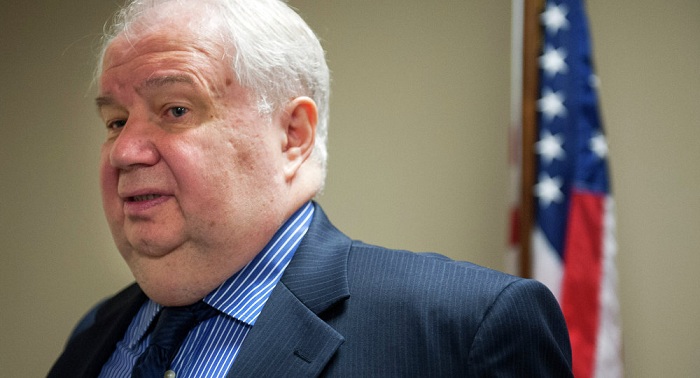"With all of the critical points and cataclysms in the world, Russia and the US, the leading countries with decisive influence on the condition of global stability and security, cannot allow themselves the luxury of not speaking with one another," Kislyak said in an interview with RIA Novosti.
Kislyak said that Moscow and Washington continue to work together on international and regional issues, including Iran`s nuclear program, the Middle East conflict, the nuclear issue on the Korean Peninsula, and Ukraine.
Russian Foreign Minister Sergei Lavrov addresses during the 51st Munich Security Conference at the `Bayerischer Hof` hotel in Munich February 7, 2015.
"We do this so as to act together on solving the problems themselves, and this falls under Russia`s interests, or we directly deliver Russia`s position to Washington. US-Russian joint activity brings real results," Kislyak added.
According to the ambassador, the two countries are currently going through one of the roughest periods in the past few decades.
"Russian-American relations are currently enduring one of the most difficult periods over the last few decades. But I`ll say honestly, it`s not always easy with the Americans, that`s their "genetic code," Kislyak told RIA Novosti.
The Russian ambassador added that Moscow sees its tasks as "solid, but avoiding conflicts," while trying to bring the US administration "to understanding the need to build relations on the basis of equality and mutual respect."
Calls from the United States to intensify the isolation of Russia are both counterproductive and unrealistic, Russian Ambassador to the United States Sergei Kislyak told RIA Novosti Tuesday.
“We continue to hear declarations that the United States will continue to stack up sanctions against Russia and run it into ‘isolation,’ which, in any case, is impossible,” Kislyak said.
The envoy added that harming Russia “is not the most productive approach.”
"The attempts to shift responsibility for the events in Ukraine to Russia, unilateral sanctions imposed on us, the PR war on the part of a number of Western states do not contribute to the conflict settlement," the ambassador said.
Russia will push for the United States and the European Union to influence Ukrainian authorities to put an end to hostilities in eastern Ukraine, Russian Ambassador to the United States Sergei Kislyak said.
“We will push for the United States and European Union influence Kiev’s policy in regard to an immediate ceasefire on the cities and villages of Donbas, canceling the blockades to the southeast organized by Kiev, and beginning serious talks between the Kiev authorities and the authorities of the DPR [Donetsk People’s Republic] and LPR [Luhansk People’s Republic] to find a political compromise that should be fixed in a constitutional reform,” Kislyak said in an interview with RIA Novosti.
Clashes between government troops and independence militias in southeastern Ukraine escalated in recent weeks despite the September 2014 ceasefire, with residential areas frequently coming under shelling.
Neither of the warring parties has been willing to own up to discriminate bombings that have taken scores of innocent lives. Almost 5,500 people are estimated to have died in the conflict since it broke out in April.
Kislyak stressed the importance of a constitutional reform, saying, “The country should be organized in a way that would make it comfortable and safe to live in for every single citizen, including Russian-speaking residents.”
Russia has been accusing Ukrainian government of launching an irresponsible military campaign against the predominantly Russian-speaking breakaway regions of Donetsk and Luhansk, urging the conflicting parties to hold all-inclusive talks.
On Friday, US President Barack Obama pledged to keep up anti-Russia sanctions, adding that if Moscow continues its policy on Ukraine, “Russia’s isolation” will only worsen both politically and economically.
Russia-US relations have come under severe strain as tensions in crisis-torn Ukraine have flared. The West is claiming that Moscow is responsible for the escalation of tensions in Ukraine and imposed several rounds of sanctions against Russia in response.
The move has had a negative impact on a number of mutual partnership agreements across various spheres of cooperation.
More about:















































